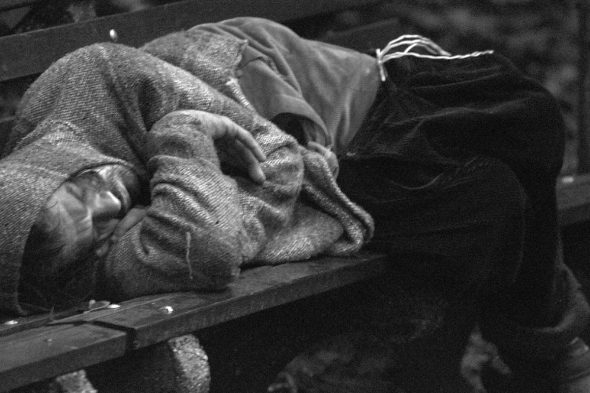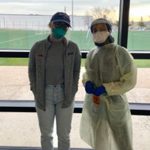UIC helping the homeless combat COVID-19

There’s growing concern for the homeless community since COVID-19 arrived in Chicago.
That’s why various nonprofits, shelters, city and health care leaders have come together to address the problems those experiencing homelessness are facing while protecting public health.
The Unsheltered Chicago Coalition, formerly known as the Westside COVID Response Team, is brainstorming ways to prevent or mitigate COVID outbreaks in the city’s shelters, where some of the most medically vulnerable live in crowded open areas, prone to be cluster sites. Each day, the team hosts two conference calls with community leaders, city government and providers.
UIC’s Dr. Stockton Mayer said the intent of the response team is to “advocate for an appropriate population-specific response” to COVID-19 in the city’s homeless population.
“I joined the group because many of our clients at the Community Outreach Intervention Projects (School of Public Health) experience homelessness,” said Mayer, assistant professor of clinical medicine in the College of Medicine. “We didn’t feel we had a solution for how to best serve them as providers.”
Pulling from city’s resources
The Unsheltered Chicago Coalition is a collaboration between some of the city’s health providers — Rush University Medical Center, UI Health, Cook County Health, Lawndale Christian Health Center, Salvation Army and Heartland Alliance in particular.
Mayer co-leads the testing team at multiple shelters in the city. The team responds to outbreaks at shelters throughout the city. In addition to testing, they offer infection control support, personal protective equipment or PPEs, and provider support.
“Pacific Garden Mission was one of the first shelters where we tested broadly,” he said. “However, we’ve tested over 1,000 citizens in the last two weeks.”
Mayer and UIC infectious disease chief Dr. Richard Novak also are guiding development of screening and point of care testing in Westside crisis shelters. Another UIC doctor on the team has developed infection control guidelines for the shelters to follow.
A big concern right now, Mayer said, is finding housing solutions for those who recover from COVID-19.
Dr. Evelyn Figueroa, professor of clinical family medicine, family medicine residency program director and community activist, developed an emergency COVID response team for Pacific Garden Mission, Chicago’s largest homeless shelter. Through that operation, the first and largest homeless shelter COVID isolation unit was opened on April 10 and has provided infirmary-level care for over 160 individuals experiencing homelessness. The PGM Emergency COVID Medical Response Team is composed of family medicine residents, medical students, registered nurses, and additional clinicians from UI Health, Rush Medical Center and Lawndale Christian Health Center.
“Tens of thousands of adults and children are living with unstable housing. The infection control aspects of COVID (hand hygiene, masking, social distancing, education) present significant challenges to people experiencing homelessness,” Figueroa said. “Public go-to places for sink bathing and phone charging are closed due to the stay-at-home order. By recognizing and addressing the unique medical and social challenges that homeless shelters face, we have successfully provided both COVID-related care as well as primary care, medication-assisted treatment and social services.”
Stephen Brown, UI Health director of preventive emergency medicine, plays a logistical role. In a community with resources already stretched thin, he was recently able to work with colleagues at Cook County Health to mine data sources and assemble a list that identified 425 congregate living facilities — places typically for residents 55 years of age or older —to help as many people as they can.
Centene, the largest Medicaid insurance carrier in the state, approached Brown last week. After a brief video conference, Centene’s team donated 100,000 masks and $150,000.
Brown has built relationships over several years with law enforcement, EMS, mental health, substance use and city agencies.
“I listen to the calls and connect in resources that will be useful to the team,” he said. “At the moment, I am lining up de-escalation training for shelter staff for those patients with serious mental illness that may be decompensating.”
Keeping people informed

While the Unsheltered Chicago Coalition is acting as a citywide resource hub, a group of UIC students has joined forces to support Stockton’s team if needed during the pandemic. They are on the ground doing screenings, supporting community-based testing, supporting staff testing, and calling on local organizations to identify their needs.
The organization, called COVID Rapid Response Team Chicago, or COVID RRT Chicago, has more than 250 UIC volunteers accepting requests for help. The volunteers include graduate and undergraduate students in medicine, nursing, applied psychology, and physical and occupational therapy.
The team provides daily symptom screenings at shelters to help track spread of COVID-19 and to protect the guests. They have implemented ‘shelter support days,’ which includes medication packaging, preparing supplies, and providing enrichment activities to the guests, including informational health sessions and interactive/creative activities. Right now, Pacific Garden Mission is the focus of their screenings.
”This is why I’m in medicine,” said co-organizer Sofia Sami, a new medical school graduate of UIC. “This moment is going to leave a huge impact on Chicago and many people globally. It will and should force us to think of community medicine, organized medicine, social medicine, and our lack of public health infrastructure.
As lead strategist for the group, Sami supports Dr. Mayer’s team with rapid testing in shelter sites, and throughout the day, participates on different partner project calls working to carve out opportunities for support — at UI Health and broadly in the community.
The group has created a volunteer training manual that outlines safety precautions, PPE and screening protocols that have been approved by physicians who are working with them to provide the screenings.
“We are the future of health care. We have dedicated our life’s work to improving the health and well-being of the population, yet there is no clear role for us in the response to the COVID pandemic,” said co-organizer Taylor Vandenberg, a first-year medical student at UIC.
Vandenberg said being a medical student right now is a very emotionally charged experience that many are struggling to cope with.
“I wanted to use my understanding of health and medicine to fill in the gaps that our health care providers cannot always reach due to overwhelming need in hospitals and clinics,” she said. “Those realizations led me to this work, helping to protect the health and well-being of a very vulnerable population, which I have found to be a highly valuable experience.”
Ultimately, Vandenberg said, choosing how to respond to this pandemic is a very complex and personal decision.
“Whatever you are doing, whether it be active volunteering, remote volunteering/research, or simply abiding by the shelter-in-place policy and taking care of yourself, there is no right or wrong approach,” she said.
Other schools participating in the COVID RRT Chicago include Northwestern University, Rush University, University of Chicago, Loyola, and Rosalind Franklin University in North Chicago.
To volunteer, visit the website here.
Follow along with the volunteers on Twitter.
